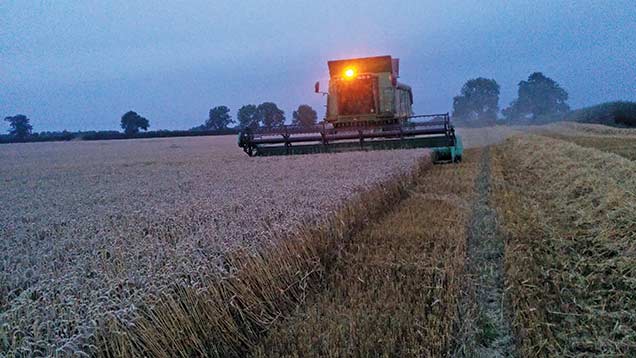Harvest 2015 round-up: Rain causes worries over grain quality
 Photo by Richard Wilkinson
Photo by Richard Wilkinson Wet weather is causing damage to standing crops, with many growers cutting at high moisture contents to prevent deterioration.
See also: Wet weather delays harvest by two weeks in some areas
South West
David Butler is being frustrated by the rain at East Wick Farm, Marlborough, Wiltshire.
“We have cut about three-quarters of crops in terms of acreage but we still have half the wheat left to cut,” he says.
Yields have been good but the rain has caused some sprouting in the ear and lodging damage.
The wheat variety Zulu has been yielding well, but is suffering with the weather.
“It has been a frustrating harvest, but yields were pleasing before the rain started,” he says.
“It has been a frustrating harvest, but yields were pleasing before the rain started”
David Butler, Wiltshire grower
West
Combining has also been delayed for John Wilcox at Batch Acre Hall, Stratford, Staffordshire, with more than an inch of rain on Monday (31 August).
He says wheat has done well, with some achieving 12.35t/ha, but there is still 120ha left to cut, and grain is now coming in at 17% to 18% moisture.
Grain protein contents for Skyfall and Crusoe have been about 11.8%, which he has been very happy with given the yield.
Cassia and Volume winter barley achieved 9.88t/ha, while Mr Wilcox still has 20ha of spring barley left to cut.
The wet ground is making potatoes hard to lift and is also causing difficulties with drilling oilseed rape.
However, three or four good days of weather would tidy harvest up now, he says.
North
In North Yorkshire, rain stopped play over the weekend for Andrew Gloag at Busby House Farm, Stokesley, but the wheat harvest has been great so far.
“We have cut 240ha of 728ha with yields averaging 12.84t/ha and bushel weights of 78-80kg/hl,” he says.
Mr Gloag has grown Diego, Santiago and Revelation with everything yielding more than 12.35t/ha.
He adds that the rest of the wheat looks well and everything is standing but it depends on the weather now.
He reports a record winter barley harvest, while the oilseed rape came off at just over 4.94t/ha.
“There is a slight sense of gloom and worry over the weather but it is a false economy to wait for it to be dry as there is a risk of losing out on weight”
Andrew Dewing, Dewing Grain
Also in Yorkshire, Richard Wilkinson cut Revelation second wheat at Corpslanding Holme Farm, Hutton Cranswick, on Friday, which averaged 12.59t/ha. Kielder as a first wheat averaged 13.83t/ha.
East
Wet weather is causing some nervousness in Norfolk with growers now cutting wet and having to dry crops, according to Andrew Dewing, chief executive at Dewing Grain.
“There are some pre-germination and splitting issues after the recent rains.
“Wheat yields are likely to remain the same but quality and bushel weights are likely to suffer,” he says.
About a third of wheat crops in East Anglia are still in the field, with many growers itching to get combining.
“There is a slight sense of gloom and worry over the weather but it is a false economy to wait for it to be dry as there is a risk of losing out on weight,” says Mr Dewing.
“It has been unbelievable with wheat averaging more than 12t/ha and all the milling crop in good condition”
Robert Spencer, Canterbury grower
Harvest could be wrapped up in the area in about a week if there is dry weather but there is potentially an enormous crop in Lincolnshire and Yorkshire that has not been touched yet, he adds.
South East
In Kent, the past three weeks have been a real struggle for Robert Spencer at Lower Garrington Farm, Canterbury, but yields have been the best ever.
“It has been unbelievable with wheat averaging more than 12t/ha and all the milling crop in good condition,” he says.
Mr Spencer grew Santiago, Evolution and Dickens – which did particularly well, with one plot achieving 13.3t/ha. However, another plot suffered from eyespot and averaged 11t/ha.
The oilseed rape variety PT211 produced variable yields due to pigeon damage, yielding between 2.8t/ha and 5t/ha, with an average of 4t/ha.
The 20ha of Propino spring barley averaged 8.1t/ha, which Mr Spencer was pleased with, leaving just some beans to harvest.
“Everything went very well to start with, despite the drought, but it has been a struggle since,” he says.

